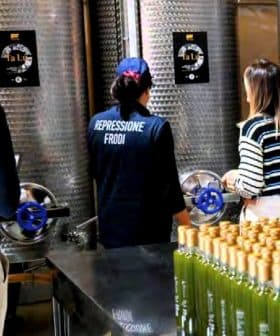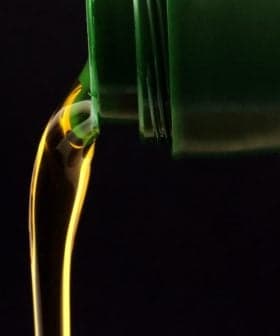$250M of Fake, Substandard Foods Seized in Global Operation
In Denmark, the operation focused samples of olive oils sold in supermarkets to check their compliance with labeling regulations. Results showed that many of the 'virgin olive oils' tested were blends or lampante oil.
 Authorities in Indonesia discovered a factory producing a range of fake condiments and sauces in unsanitary conditions. (Photo: Interpol)
Authorities in Indonesia discovered a factory producing a range of fake condiments and sauces in unsanitary conditions. (Photo: Interpol)In a global operation involving 61 countries, €230 million worth of counterfeit and substandard food and beverages were seized by INTERPOL and Europol, uncovering a wide range of food fraud including counterfeit mineral water, olive oil, and luxury goods. The operation, known as OPSON VI, targeted criminals behind fraudulent food practices and resulted in the seizure of 9,800 tons of food, 26.4 million liters of liquids, and 13 million items, with participating countries conducting national operations involving police, customs officers, food regulatory bodies, and private sector partners.
In a joint operation between INTERPOL and Europol, €230 million of counterfeit and substandard food and beverages were seized. The operation, which was carried out across 61 countries, unveiled a wide range of food fraud across products ranging from olive oil to luxury goods and alcoholic drinks.
Criminals will fake any type of food and drink with no thought to the human cost as long as they make a profit.
Operation OPSON VI targeted the criminals behind fraudulent food practices and uncovered new trends in food fraud. Counterfeit mineral water was among the fake products detected during the global operation.
In a press release, Françoise Dorcier, Coordinator of INTERPOL’s Illicit Goods and Global Health Programme said, “This operation has once again shown that criminals will fake any type of food and drink with no thought to the human cost as long as they make a profit. Whilst thousands of counterfeit goods have been taken out of circulation, we continue to encourage the public to remain vigilant about the products they buy.”
61 countries took part in OPSON VI from December 1, 2016 to March 31, 2017. Each country carried out its own national operation involving police, customs officers, food regulatory bodies and private sector partners.
A total of 50,000 checks were made on shops, markets, airports, seaports and industrial estates. By the end of the operation, 9,800 tons of food, 26.4 million liters of liquids and 13 million items had been seized.
Operation #Opson VI: Authorities in #Indonesia discovered a factory producing a range of fake condiments & sauces in unsanitary conditions pic.twitter.com/8dSlPqpGTL
— INTERPOL (@INTERPOL_HQ) April 25, 2017
In Denmark, the operation focused on olive oil. The Veterinary and Food Administration analyzed samples sold in supermarkets to check their compliance with labeling regulations. Results showed that many of the “virgin olive oils” tested were in fact blends, or lampante oil.
Authorities in Norway and Austria also tested samples of olive oil during the operation. Their findings were not released but details will be reported later this year.
Participating countries received specific Europol training on olive oil quality prior to the operation to aid them in detecting fraud.
Fraudulent food operations were found to be rife and widespread. In Germany, hazelnut products were found to contain undeclared peanuts, while in France, fake seasoning cubes were being passed off as a leading brand.
.@INTERPOL_HQ SEIZED: 9,800 tonnes & 26.4 million litres of hazardous fake food & drink, incl. mineral water, seasoning cubes, seafood & olive oil #Opsonpic.twitter.com/Y65N7vNdff
— Europol (@Europol) April 25, 2017
In Italy, mineral water and wine came under the spotlight. 266,000 liters of fake mineral water, packaged similarly to a trademarked brand were discovered. Counterfeit wine posing as a famous, protected brand was also seized.
In Greece, five people were arrested following the discovery of alcohol smuggled from Bulgaria. Around 1,300 liters of vodka and whiskey were seized.
In Portugal, sardines past their prime were packed in an unlicensed plant. Meanwhile, in Spain, clams unfit for human consumption were sold.
In Ireland, criminals were caught red-handed transporting unrefrigerated, unpacked and unlabeled meat in a van along with tobacco and alcohol.
61 countries participated in OPSON VI, a rise from 57 in 2016. This was the sixth successive joint operation.









